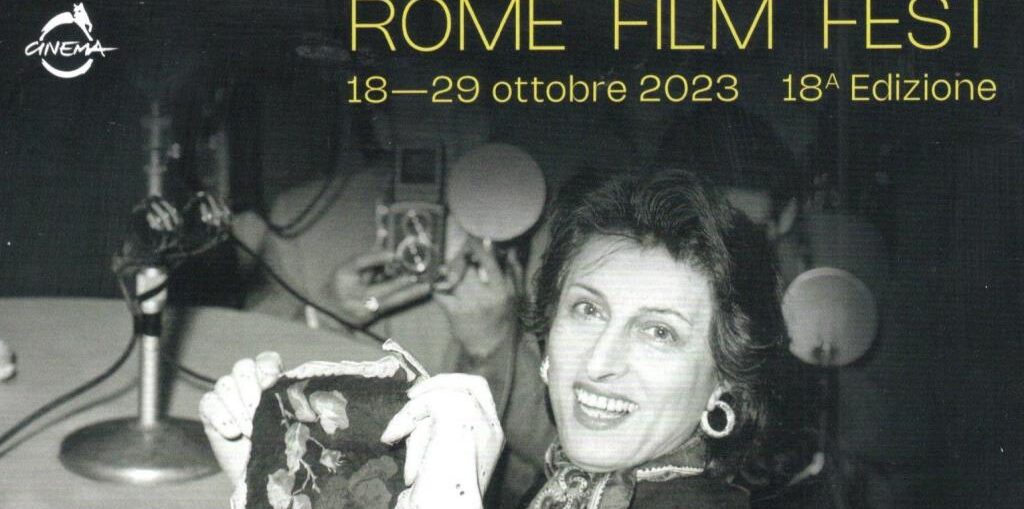
(from Rome Luigi Noera with the kind collaboration of Stefano Sica and Valentina Vignoli – The photos are published courtesy of the Fondazione Cinema peri Roma)
On the first day the two opening films had a great and deserved success
PROGRESSIVE CINEMA COMPETITION
 Opening film: THERE'S STILL TOMORROW by Paola Cortellesi, Italy, 2023, 118’ | First work |
Opening film: THERE'S STILL TOMORROW by Paola Cortellesi, Italy, 2023, 118’ | First work |
SYNOPSIS: Delia (Paola Cortellesi) she is Ivano's wife, the mother of three children.
Wife, mother. These are the roles that define her and that's enough for her. We are in the second half of the years 40 and this ordinary family lives in a Rome divided between the positive push of liberation and the miseries of the recent war.
Ivan (Valerio Mastandrea) he is the supreme head and master of the family, he works hard to bring the little money home and never misses an opportunity to underline it, sometimes with contemptuous tones, other, directly with the strap. He only has respect for his scoundrel father, Sor Ottorino (Giorgio Colangeli), a lecherous and despotic old man for whom Delia is to all intents and purposes the carer. Delia's only relief is her friend Marisa (Emanuela Fanelli), with whom he shares moments of lightness and some intimate confidence. It's spring and the whole family is excited about the imminent engagement of their beloved first-born Marcella (Romana Maggiora Vergano), that, its part, she just hopes to get married quickly to a good classy boy
borghese, Giulio (Francesco Centorame), and finally get rid of that embarrassing family. Delia doesn't ask for anything else either, she accepts the life she has been given and a good marriage for her daughter is all she aspires to. The arrival of a mysterious letter however, it will ignite the courage to overturn pre-established plans and imagine a better future, not just for her.
REVIEW
The debut of the multifaceted actress Paola Cortellesi is a triumph! After having played characteristic roles of popular Rome (Like a cat on the bypass), this time, in addition to collaborating on the screenplay, he took the big step of directing his latest creation. A professional of our cinema loved by the public, Cortellesi with great skill mixes the tragic with the comic, turning back the clock of Italian cinema (Finally!) in a story of three generations of post-war Italian males faced with courage by the protagonist Delia.
The film shot in black and white takes us back to the neorealism of ancient memory to underline the tragedy of how Italy emerged from the Second World War in which Italians try to get back on their feet. But the story presents us above all with the desire to shake off gender stereotypes that see women as inferior.
Divorce is still a non-existent topic and the only way out is to run away. Delia has a dear fruit-growing friend who was lucky enough to have a loving husband, which supports her and incites her to rebel against abuse.
As was noted during the presentation of the film, this arises from the need to remember where we come from for the new generations because there are still tragically many feminicides about which we listen to the news reports almost every day.
Delia has a husband Ivano who is violent by culture and despite everything her desire for redemption prevails over daily events. Like any parent, she wants the best for her young daughter and when she sees that the engagement with the handsome young man is a prelude to a repeat of her story, she doesn't mind breaking up the engagement..
We must applaud the screenplay with many twists and turns, the last of which we cannot reveal is a prelude to an Italy in which finally (and it is the 1946) women will also have a say in choosing the policies of the Bel Paese.
As the director herself said, this film is a tribute to the many anonymous Italian women who found redemption in the home marked by so many abuses.
If there's one thing we have to complain about, it's the choice of digital which doesn't go hand in hand with black and white.. But the film will certainly make your hands raw with applause!
 ALICE IN THE CITY – COMPETITION
ALICE IN THE CITY – COMPETITION
How To Have Sex di Molly Manning Walker – UK, 2023, 98’
SYNOPSIS:Three English girls go on holiday to Malia and experience the trip as a rite of passage. They only think about drinking, go to the disco and hook up, thus finding themselves navigating the complexity of sex, of consensus and self-discovery. Described with plays of light and a perfect soundtrack, Manning Walker's directorial debut paints a painfully familiar portrait of young adulthood and what one's first sexual experiences should be (or they shouldn't) unfold.
 REVIEW
REVIEW
The independent section at the side of the Rome Film Festival could not have chosen better than the film by debutant Molly, winner at Cannes in the Un Certain REgard section with her explosive feature film on adolescence and all its consequences.
In the presentation the director underlined several times her main intention of denouncing the lack of empathy between the two male and female genders.
It is true that love is now reduced to commodification and the price is paid by the generations of the third millennium of the opulent West, while in still backward societies we witness the phenomenon of child brides. However, we ask ourselves whether even in this case, as in the inaugural film of the Festival, it is not the gender problem that is at the center of attention.
The young teenager Tar (Taz for friends) at the end of his secondary school studies he goes on holiday to a summer tourist destination where getting high is a must and where you can't sleep.
Here hundreds of kids find themselves in a collective rite of initiation into adulthood without, however, having passed the previous stages..
And so three girls who grew up on chips and coke find themselves getting high for three days in a whirlwind of obsessive music. The director throws this truth in our faces and when we too, the spectators, are exhausted, the film changes direction and takes on the heavy tones of dismay..
Tar, although apparently willing to lose her virginity, is overwhelmed by Paddy's lack of empathy, his lover – I would say rapist – for the first time. The other male character, although he seems to have the good side, actually also has his responsibility by stepping aside in crucial moments.
At the end it was just a summer experience and this is demonstrated by Taz's cry at the airport gate: London we are returning.
Let's add, however, that we adults also have our part in this unraveling because throughout the film the parents of the three girls only manage to send feel-good messages, and that's not how teenagers become adults, but let's also add whoever is without guilt cast the first stone!
From a cinematographic point of view, the film is a discovery of a new talent.
